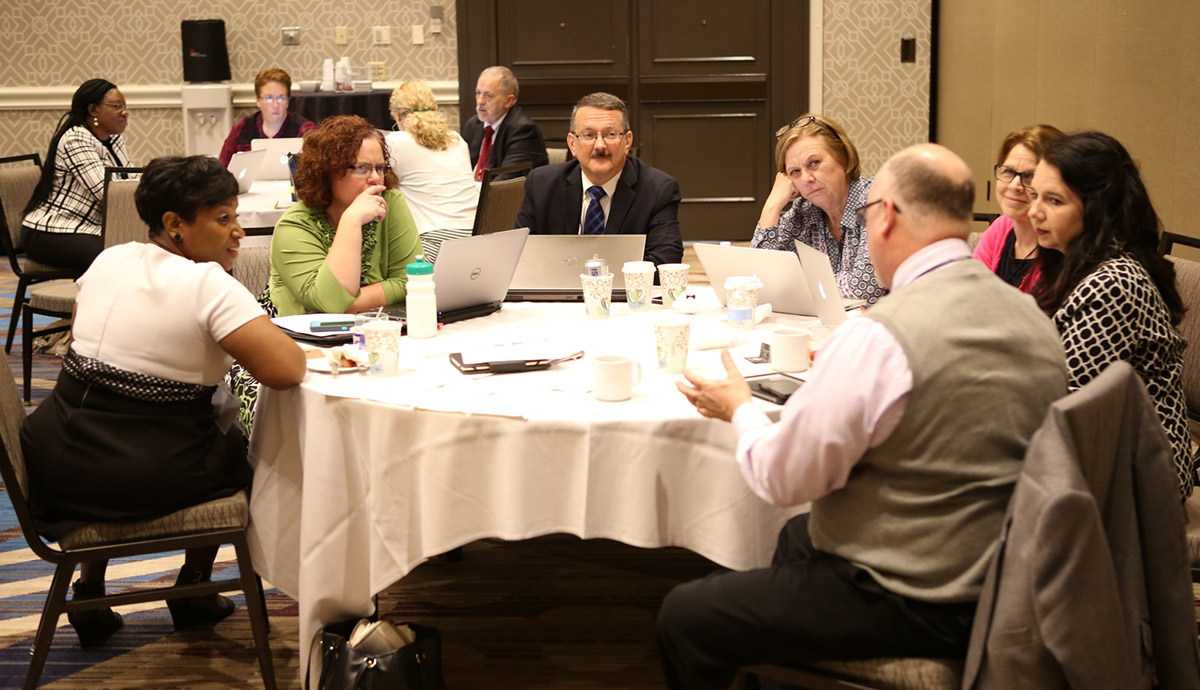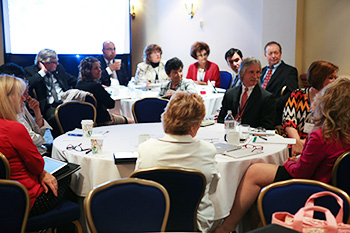29 Jul2016
By Aaron Goldstein
Ed Prep Matters is pleased to bring you this special feature on state policy and AACTE state chapter activity. For a summary of the year prior to the summer, see this article.
Overview of State Policy Activity
Only a handful of state legislatures actively met in July, as over 40 state legislative sessions had adjourned for the year. No educator preparation-related bills were introduced, although Illinois enacted two bills into law. One of them modifies the professional development requirements for educator license renewal. The other law allows a principal endorsement to be added to an existing professional educator license if the individual meets certain requirements, such as having taught for at least 4 years.
30 Jun2016
By Aaron Goldstein
Ed Prep Matters is pleased to bring you this special feature on state policy and AACTE state chapter activity. For a summary of the year prior to June, see this article.
Overview of State Policy Activity
In June, state policy activity slowed down to a crawl, as more than 30 state legislative sessions have adjourned for the year. Currently, only nine state legislatures are in their 2016 session, while three state legislatures are in a special session.
Nine education-related bills in four states–Delaware, New Jersey, New York, and Pennsylvania–were introduced in June. These bills covered issues including offering loan forgiveness for educators employed in “failing schools,” expanding pathways into the teaching profession by modifying certification requirements for substitute teachers, and creating a tiered licensure structure for educators.
20 Jun2016
By Aaron Goldstein
The Council of Chief State School Officers has released a new guide for state policy makers to engage stakeholders on the Every Student Succeeds Act (ESSA) implementation, and educator preparation providers (EPPs) are among the two dozen groups recommended for consultation. Although the guide indicates that EPP input is required only for state Title II grant applications, it encourages states to “not stop there” but rather engage whatever perspectives best represent the state’s interests. AACTE encourages its members and state chapters to get involved with their state’s ESSA implementation in as many areas and as early as possible.
15 Jun2016
By Alan H. Jones

The California Council on Teacher Education (CCTE) has for several decades viewed the preparation of new teacher educators to be among its most important responsibilities. Semiannual CCTE conferences have always been open and welcoming to graduate students and newly hired teacher education faculty. In recent years, however, the organization, which has served as the California state chapter of AACTE since a merger with the California Association of Colleges for Teacher Education in 2000, has created more purposeful programs to recruit and mentor future teacher educators.
14 Jun2016
By Jerrica Thurman

The value of “acting as one” was the resounding message highlighted throughout AACTE’s Washington Week, June 5-8, themed “Diverse Perspectives, Deep Partnerships, One Profession.” Attendees were urged to join forces with fellow educators across conventional boundaries to build professional and political coalitions in order to effectively advocate for shared values. From connections made during the Holmes Scholars Summer Policy Institute to panel discussions at the State Leaders Institute through Day on the Hill advocacy work, the importance of building partnerships was stressed by invited partners and AACTE member participants alike.
14 Jun2016
By Ann E. Larson
What an inspirational and invigorating experience I had last week at AACTE’s State Leaders Institute (SLI)—in my 7th year participating in AACTE’s Washington Week!

SLI was held June 5-6 at the Crystal Gateway Marriott in Arlington, Virginia. Thirty-five states were represented by 60 attendees, many of whom were new faces adding to SLI’s rich and continuing conversations. This enrollment represented an increase from last year of 10 additional AACTE state chapters and also included 20 attendees who returned from the 2015 institute.
Over the course of 2 days, we enjoyed ample and fulfilling opportunities to engage with expert panelists, peers sharing research-based and cutting-edge practices in preparing high-quality teachers and leaders for PK-12 schools, federal updates, policy trend overviews, advocacy and coalition planning, working with policy makers and their staffers, working with the media, and individual and state chapter strategic planning work time. We also had the pleasure to interact at a special reception with not only each other but also a cohort of AACTE Holmes Scholars—graduate students from across the country who represent the brightest future in the profession.
31 May2016
By Aaron Goldstein
Ed Prep Matters is pleased to bring you this special feature on state policy and AACTE state chapter activity. For a summary of state activities from January through April 2016, see this article.
Overview of Policy Activity
In May, state policy activities have begun to slow, as many state legislatures have adjourned their 2016 legislative sessions. This month, only 15 state legislatures have been in regular session, while four states have been in a special session. Six education-related bills were introduced this month in two states, New York and North Carolina. These bills covered issues such as offering loan forgiveness for teachers, supporting reimbursement for National Board certification, authorizing alternative routes to the teaching profession, and amending admission requirements for graduate-level preparation programs for teachers and school leaders.
16 May2016
By Anna E. McEwan

Chapter leaders listen intently at the 2015 State Leaders Institute
In 2015, I participated for the first time in AACTE’s State Leaders Institute (SLI). In thinking about what I gained from participation, the phrase that comes to mind again and again is a sense of connection.
Psychological research suggests that those who feel consciously connected with others—or with their environment, or with anything that is larger than themselves—tend to be more physically and mentally healthy than others. Perhaps it’s too lofty to suggest that your participation in SLI will improve your overall well-being, but I can testify to several practical benefits!
16 May2016
By Ena Shelley, Kandi Hill-Clarke and Judy Sheese

Members of the IACTE Executive Committee at the chapter’s inaugural Day at the Statehouse in February
Last year, the Indiana Association of Colleges for Teacher Education (IACTE) received an AACTE State Chapter Support Grant to fund the creation of a statewide advocacy consortium. In order to disrupt the dominant discourse that negatively portrays teacher education programs, educators, and schools, IACTE sought to collaborate with “partners in practice” to tell positive stories and create a unified message of the education profession. We held a series of productive conversations and meetings, culminating in the capstone experience of the first IACTE “Day at the Statehouse” event in February.
Our partners in this work included the Indiana Association of Public School Superintendents, the Indiana Association of School Principals, the Indiana State Teachers Association, the Indiana School Boards Association, and the education honorary, Kappa Delta Pi.
05 May2016
By Jerrica Thurman
Please join AACTE for a free policy discussion and reception June 6! RSVP here.
Each summer, AACTE’s State Leaders Institute (SLI) brings together leaders of the Association’s state chapters to discuss important trends in state policies and to advocate for the profession. This year, the institute will be held June 5-6 as part of AACTE’s 2016 Washington Week, themed “Diverse Perspectives, Deep Partnerships, One Profession,” at the Crystal Gateway Marriott in Arlington, VA.
 Thanks to a grant from the Learning First Alliance’s Get It Right campaign, the 2016 SLI will offer interactive sessions highlighting how state policy for college- and career-ready standards will be affected by the recently passed Every Student Succeeds Act (ESSA) and the implications for educator preparation. Participants will gain a deeper understanding about the uniqueness of individual states, find ways in which they are similar, and discover how those similarities can help frame a common message.
Thanks to a grant from the Learning First Alliance’s Get It Right campaign, the 2016 SLI will offer interactive sessions highlighting how state policy for college- and career-ready standards will be affected by the recently passed Every Student Succeeds Act (ESSA) and the implications for educator preparation. Participants will gain a deeper understanding about the uniqueness of individual states, find ways in which they are similar, and discover how those similarities can help frame a common message.
03 May2016
By Jerrica Thurman

AACTE’s Washington Week this June will be based at the Crystal Gateway Marriott in Arlington, VA, located minutes away from downtown Washington, DC. Take advantage of AACTE’s special hotel rate and get complimentary high-speed Internet in guest rooms and meeting spaces when you make your hotel reservation within the AACTE room block by May 16.
The hotel offers guests complimentary shuttle service to and from the Reagan National Airport, just one mile away. Enjoy the Crystal Gateway Marriott hotel amenities, including three on-site dining options and convenient lobby access to the Metro.
The hotel will host most of the events of AACTE’s Washington Week June 5-8, ranging from advocacy opportunities to policy briefings, networking receptions, and more under the theme “Diverse Perspectives, Deep Partnerships, One Profession.”
02 May2016
By Aaron Goldstein
Ed Prep Matters is pleased to bring you this special feature on state policy and AACTE state chapter activity. For a summary of March’s state activity, see this article; February’s state activity is available here.
Overview of State Policy Activity
Thanks to AACTE’s State Policy Tracker, we can identify trends in state legislation and regulations related to educator preparation.
So far this year, approximately 300 state bills related to educator preparation have been introduced. Of these, 186 were related to certification and standards, and 18 have been enacted. Many of these laws are related to lowering certification standards for alternative-route programs, differentiated licensure standards for certain subjects including STEM fields and career and technical education (CTE), and allowing more pathways into teaching to alleviate shortages. Seven bills related to teacher certification and shortages have been signed into law in 2016 with themes such as expanding scholarships for teacher candidates and offering loan forgiveness for teachers. Five state bills have been signed into law related to teacher licensure standards.
18 Apr2016
By Rod Jonas
The North Dakota Association of Colleges for Teacher Education (NDACTE) received an AACTE State Chapter Support Grant last year to assist with the development and administration of a set of common assessments to be used by all North Dakota teacher preparation programs to improve the effectiveness of programs and quality of graduates.
During this school year, members of NDACTE have engaged in meetings and training workshops to learn how to effectively implement four common assessments: the Preservice Teacher Exit Survey, the Transition to Teaching Survey, the Supervisor Survey, and the Preservice Teacher Observational Assessment.
18 Apr2016
By Shelly Meyers
It is no secret that South Carolina has faced many challenges related to education. Most recently, a shortage of teachers has been severely affecting the most vulnerable regions of South Carolina: our rural and poverty-stricken regions. In a state where most students live below the poverty level, there are some unsung heroes doing their best with the lowest of means, but we desperately need to improve our recruitment and retention of professional educators.
One way the state is supporting this goal is through Proviso 1A.73, also known as the Rural Teacher Recruiting Incentive. The FY16 budget allows for $1.5 million to be spent on this plan. The Center for Educator Recruitment, Retention, and Advancement (CERRA) at Winthrop University along with the South Carolina Department of Education and the Education Oversight Committee has been charged with the responsibility to develop the initiative, and CERRA Executive Director Jane Turner submitted the plan for the first year in January 2016 with multiple components:
14 Apr2016
By David Hough
In February, the Louisiana Department of Education hosted representatives from six states in the Council of Chief State School Officers’ Network for Transforming Educator Preparation (NTEP). Formed in 2013, this aligned action network brings together state chiefs and their education agency staff who are committed to activating key policy levers around licensure, program approval, and data as they transform educator preparation in their respective states. As a representative from the Missouri NTEP team, I joined colleagues from five states—Georgia, Massachusetts, New Hampshire, Oklahoma, and Washington—on the visit to Baton Rouge to attend Louisiana’s Believe and Prepare Community Meeting and learn from the work of practitioners, programs, and districts across Louisiana leading efforts to improve educator preparation.












 Thanks to a grant from the
Thanks to a grant from the 